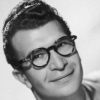Dave Brubeck

Dave Brubeck
David Warren "Dave" Brubeckwas an American jazz pianist and composer, considered to be one of the foremost exponents of cool jazz. He wrote a number of jazz standards, including "In Your Own Sweet Way" and "The Duke". Brubeck's style ranged from refined to bombastic, reflecting his mother's attempts at classical training and his improvisational skills. His music is known for employing unusual time signatures, and superimposing contrasting rhythms, meters, and tonalities...
NationalityAmerican
ProfessionPianist
Date of Birth6 December 1920
CityConcord, CA
CountryUnited States of America